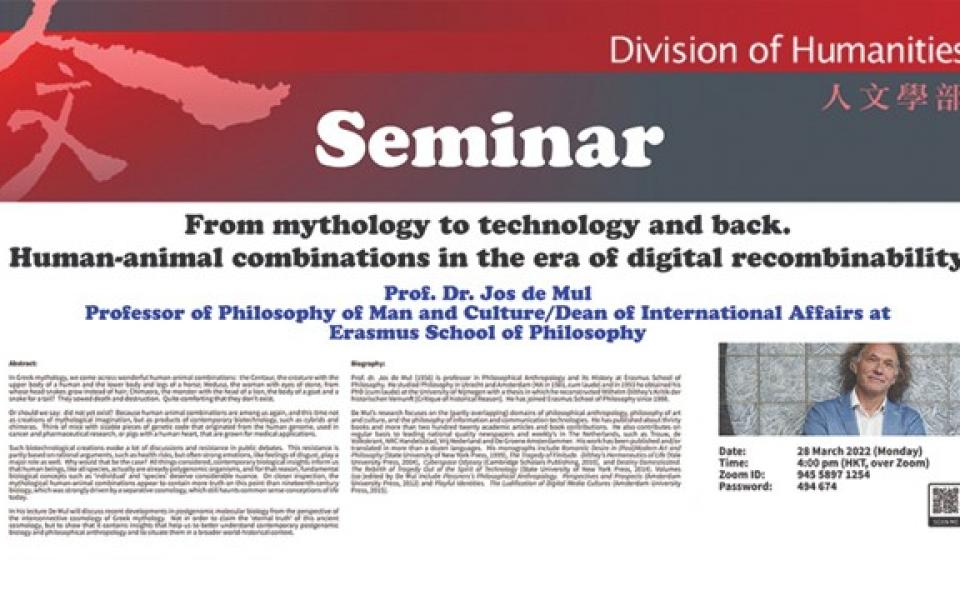Division of Humanities Seminar - From mythology to technology and back. Human‐animal combinations in the era of digital recombinability
Supporting the below United Nations Sustainable Development Goals:支持以下聯合國可持續發展目標:支持以下联合国可持续发展目标:
Abstract:
In Greek mythology, we come across wonderful human-animal combinations: the Centaur, the creature with the upper body of a human and the lower body and legs of a horse; Medusa, the woman with eyes of stone, from whose head snakes grow instead of hair; Chimaera, the monster with the head of a lion, the body of a goat and a snake for a tail? They sowed death and destruction. Quite comforting that they don’t exist.
Or should we say: did not yet exist? Because human-animal combinations are among us again, and this time not as creations of mythological imagination, but as products of contemporary biotechnology, such as cybrids and chimeras. Think of mice with sizable pieces of genetic code that originated from the human genome, used in cancer and pharmaceutical research, or pigs with a human heart, that are grown for medical applications.
Such biotechnological creations evoke a lot of discussions and resistance in public debates. This resistance is partly based on rational arguments, such as health risks, but often strong emotions, like feelings of disgust, play a major role as well. Why would that be the case? All things considered, contemporary biological insights inform us that human beings, like all species, actually are already polygenomic organisms, and for that reason, fundamental biological concepts such as ‘individual’ and ‘species’ deserve considerable nuance. On closer inspection, the mythological human-animal combinations appear to contain more truth on this point than nineteenth-century biology, which was strongly driven by a separative cosmology, which still haunts common sense conceptions of life today.
In his lecture De Mul will discuss recent developments in postgenomic molecular biology from the perspective of the interconnective cosmology of Greek mythology. Not in order to claim the ‘eternal truth’ of this ancient cosmology, but to show that it contains insights that help us to better understand contemporary postgenomic biology and philosophical anthropology and to situate them in a broader world-historical context.
Biography:
Prof. dr. Jos de Mul (1956) is professor in Philosophical Anthropology and its History at Erasmus School of Philosophy. He studied Philosophy in Utrecht and Amsterdam (MA in 1981, cum laude) and in 1993 he obtained his PhD (cum laude) at the University of Nijmegen with a thesis in which he reconstructed Wilhelm Dilthey’s Kritik der historischen Vernunft [Critique of historical Reason]. He has joined Erasmus School of Philosophy since 1988.
De Mul’s research focuses on the (partly overlapping) domains of philosophical anthropology, philosophy of art and culture, and the philosophy of information and communication technologies. He has published about thrirty books and more than two hundred twenty academic articles and book contributions. He also contributes on regular basis to leading national quality newspapers and weekly’s in The Netherlands, such as Trouw, de Volkskrant, NRC Handelsblad, Vrij Nederland and De Groene Amsterdammer. His work has been published and/or translated in more than a dozen languages. His monographs include Romantic Desire in (Post)Modern Art and Philosophy (State University of New York Press, 1999), The Tragedy of Finitude. Dilthey’s Hermeneutics of Life (Yale University Press, 2004), Cyberspace Odyssey (Cambridge Scholars Publishing, 2010), and Destiny Domesticated. The Rebirth of Tragedy Out of the Spirit of Technology (State University of New York Press, 2014). Volumes (co-)edited by De Mul include Plessners’s Philosophical Anthropology. Perspectives and Prospects (Amsterdam University Press, 2012) and Playful Identities. The Ludification of Digital Media Cultures (Amsterdam University Press, 2015).
